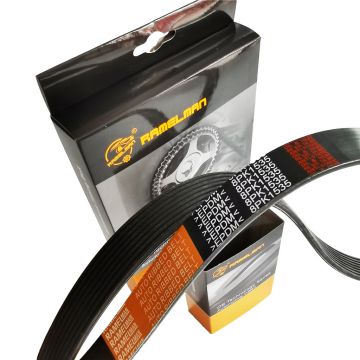This article was published more than 3 years ago. Some information may no longer be current.
A pint of beer at Establishment Brewing Co. in Calgary, on Feb. 19, 2020. The sale of Banded Peak Brewing to Labatt of Canada has caused a rift in downtown Calgary's local breweries. LEAH HENNEL/The Globe and Mail Rubber V Belt

The sale of a craft brewery in Calgary has driven a rift through an area that’s become known as the Barley Belt, with several small brewers taking down flags identifying them as part of the informal brewing neighbourhood over what they see as the invasion of “Big Beer.”
Late last month, Banded Peak Brewing, one of 10 breweries in the craft beer hub located south of downtown Calgary, announced it had been bought by Labatt Breweries of Canada. Along with the sale went the area’s trademarked Barley Belt name, which had been officially held by Banded Peak.
The community’s other craft brewers are stuck between supporting their local fraternity and fighting the influence of the mainstream beer market. In response, some have removed their Barley Belt district flags from the outside of their breweries and are vowing not to use the name as long as Labatt is involved.
Along with the sale went the area’s trademarked Barley Belt name, which had been officially held by Banded Peak. LEAH HENNEL/The Globe and Mail
“[Labatt is] a business, we are a craft brewery,” said Haydon Dewes, one of Cabin Brewing Co.’s three founders, which is located in the Belt. “We just cannot see how we can work together when we are solely focused on beer as the driving force of what we do … and their bottom line is the bottom line,” he said.
Labatt plans to create a community association with the other local breweries that would transfer ownership of the Barley Belt trademark, the company said in a statement. However, Banded Peak, now a subsidiary of Labatt, wants to continue to have a seat at the table – a partnership in which not everyone in the craft brewing community is interested.
“All of these businesses are small, locally owned, pretty much family-operated businesses,” said Dave Ronneberg, one of the founders of Establishment Brewing Co. “A lot of us don’t feel that Big Beer has our small-business best interests in mind.”
Dave Ronneberg, founder of Establishment Brewing Co., at the brewery in Calgary, on Feb. 19, 2020. LEAH HENNEL/The Globe and Mail
In a series of tweets, Outcast Brewing, which is also located in the Barley Belt, echoed the sentiment. “Unless something dramatically changes, we will focus on an independent collective of producers that doesn’t involve any Big Beer-owned brands. We stand alongside the vast majority of producers in the area in this decision. We opened to fight Big Beer, why join?” the company said.
Banded Peak established the Barley Belt trademark in 2018 on behalf of the first five breweries in the area. Up until then, the Barley Belt had been an informal name used to create a sense of community for what some now consider Calgary’s craft beer epicentre. The Barley Belt houses 10 breweries, three distilleries, one cidery and a winery.
“We think we’ll be stronger together and we intend to remain a strong presence in the area and craft beer scene here,” said Colin McLean, one of the three founders of Banded Peak.
Labatt owns other craft beer brands across the country, such as Stanley Park Brewing in British Columbia, Mill Street in Toronto and Archibald Microbrasserie in Quebec, in addition to its Labatt-brand offerings. Its parent company, global giant Anheuser-Busch InBev, owns other well-known beer brands such as Stella Artois, Budweiser and Corona.
Banded Peak established the Barley Belt trademark in 2018 on behalf of the first five breweries in the area. LEAH HENNEL/The Globe and Mail
The conflicted community response surrounding Banded Peak’s sale highlights the narrow divide between success and selling out when it comes to the craft beer industry, which Cold Garden Beverage Co. owner Blake Belding described as “fiercely local [and] independent.” Cold Garden was one of the five original Barley Belt members before splitting from the group in 2018 because of its more northern location.
“Craft beer fans are extremely loyal to craft beer,” he said, adding that on the business side, a buyout by the “big guys” means you’re doing something right, whereas your most devoted customers might not think the same way.
“In their mind, that person is no longer craft and they are no longer going to drink it,” Mr. Belding said.
Most parties agree that continued discussion about the Barley Belt name is needed. Many groups, however, hope Labatt will understand how much the moniker means to the small-business district and will let the trademark go.
“I would love to see Labatt simply walk away from that Barley Belt trademark and leave it for the purpose that it was intended, which was to bring together a group of small, independent craft breweries to market themselves," Mr. Dewes of Cabin Brewing said.
LEAH HENNEL/The Globe and Mail
We have a weekly Western Canada newsletter written by our B.C. and Alberta bureau chiefs, providing a comprehensive package of the news you need to know about the region and its place in the issues facing Canada. Sign up today.
Follow us on Twitter: @globeandmailOpens in a new window
Build your personal news feed
Build your personal news feed
© Copyright 2023 The Globe and Mail Inc. All rights reserved.

Engine Belt Andrew Saunders, President and CEO